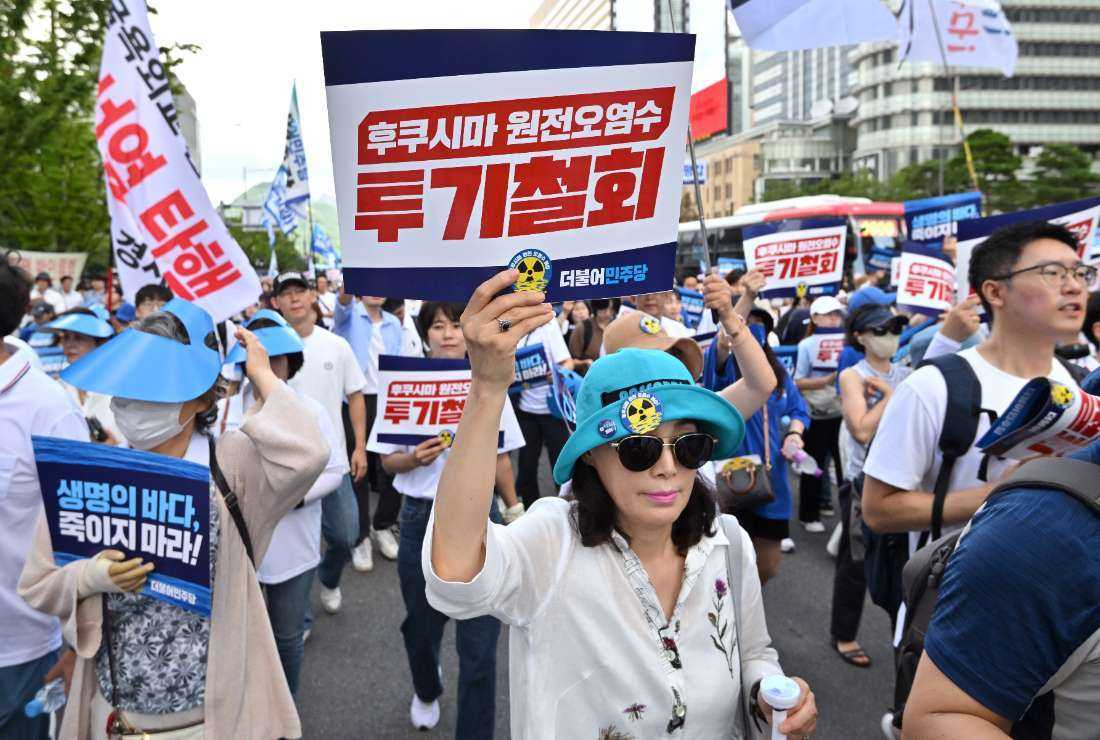
South Korea's main opposition Democratic Party members holding placards reading 'Stop dumping Fukushima nuclear-contaminated water into the ocean!' march during a rally against Japan's discharge of treated wastewater from the crippled Fukushima nuclear power plant, in Seoul on Aug. 25. (Photo: Jung Yeon-je / AFP)
Japan has started dumping more than a million tons of treated radioactive water from disaster-hit Fukushima Daiichi nuclear power plant into the Pacific Ocean, triggering condemnation from environmentalists and a political debate in South Korea, reports say.
The plant’s operator, Tokyo Electric Power Company (TEPCO) started releasing water from the power plant that was hit by the March 2011 earthquake, on Aug. 24, Kyodo news agency reported.
The dumping has aroused the indignation of neighboring countries and the concern of fishermen, who fear that the reputation, and therefore the consumption, of their products will collapse, Fides news agency reports.
In South Korea, opposition parties, civil society groups and religious communities have strongly opposed and intensified their protests against the Japanese government's decision and position of the South Korean government.
South Korean President Yoon Suk-yeol of the ruling People's Power Party officially declared that "the executive found no problem in the scientific and technical aspects of the Japanese plan".
Yoon’s administration has drawn strong criticism for the approval given in Tokyo for the release of Fukushima wastewater.
"We intend to hold the government accountable for failing to fulfill its duties", said Democratic Party leader Lee Jae-myung, calling Japan's plan to dump water from the Fukushima power plant "an act of terror."
Members of the Democratic Party and members of the government clashed in parliament over the possibility of a direct impact on South Korea.
Foreign Minister Park Jin said currents will carry water through the Pacific Ocean to the Americas before it reaches South Korea's shores.
The Seoul executive took note of the statement by the Japanese government and the International Atomic Energy Agency (IAEA), which approved the disposal plan in July, saying it met international standards and that the impact on the population and the environment would be "negligible".
South Korea accepted the IAEA's findings, while China openly voiced its opposition, calling the move "extremely selfish" and summoning the Japanese ambassador to file a formal diplomatic protest.
Public concern in South Korea over the launch of the release plan remains strong: according to polls, the majority of Koreans are worried about the possible contamination of seafood and the oceans.
In a July poll by the Media Research Institute, 62 percent of Koreans surveyed said they would reduce or stop consuming seafood once the releases occur, despite assurances from the South Korean government.
Local regional governments in Korea have announced plans to step up radiation testing of seafood products to ease consumer concerns by conducting daily tests for all seafood products on main markets, by publishing the results in real time, and by disseminating them, but it is not certain that such measures reassure consumers and encourage them not to change their eating habits.
Environmental groups, student committees and civil society organizations demonstrated in Japan and especially in South Korea, where the Korean Federation for Environmental Movements criticized Tokyo's decision which "threatens fishery products and jeopardizes the security of the Pacific countries".
In recent days, the federation has encouraged street marches and silent candlelight protests in the evening, with a peaceful march to the presidential office, declaring that "Japan is generating an irreversible calamity for South Korea and the countries of the Pacific and calling the Fukushima water dumping "a slow and silent act of nuclear terrorism".
Korean Catholic bishops’ Commission for Environment and Ecology and the Commission for Justice and Peace as well as 42 other Catholic organizations, reiterated their firm opposition to the Japanese government's decision to dump treated radioactive water into the sea.
In a joint statement at the end of June, they expressed their "extreme concern" because the move comes despite opposition from environmental groups, scientists, academics and fishing communities.
Catholic groups rejected the Japanese government's claim that "the contamination caused by the radioactive leak is calming down and the Fukushima area is safe". The statement cites a document titled "Analysis Report on Radioactive Contamination of Japanese Agricultural and Livestock Products", published by the Citizens' Radiation Monitoring Center and the Korea Federation for Environmental Movements in April 2023.
The report cites a wide range of radioactive contamination in food products: 5.3 percent of marine products, 21.1% of agricultural products and 2.6 percent of animal products. According to the report, these data call for a principle of precaution and prudence regarding human health and the ecosystem, which must be applied.
In 2021, the Korean and Japanese bishops issued a joint declaration voicing their opposition to the discharge of water from the Fukushima plant into the sea, recalling the goods to be preserved: the health of humanity and the life of Creation.
Police arrested 16 people from a rally in front of the Japanese embassy in Seoul amid protests in the country against the move, local media reported.
China has imposed a new ban on seafood imports from Japan in response.


